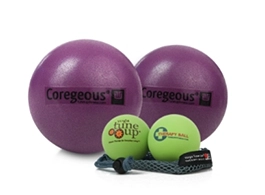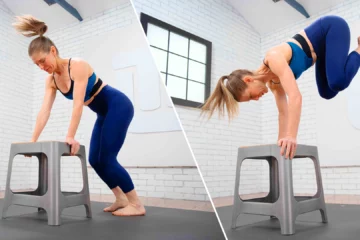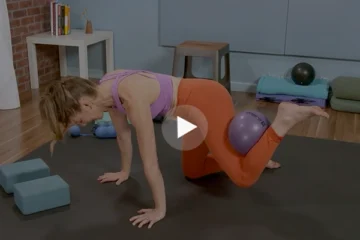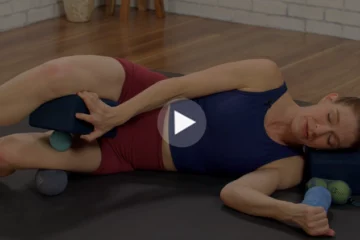
I am a yoga teacher of 18 plus years. I now teach Yoga Tune Up®. I also have MS, a somewhat hairy neurological disease. I’ll bore you with the gory details of how MS affects me some other time. Let’s just say my 17 years with MS vacillates between being a rocky road and a sweet smooth ride. Because of the unpredictable nature of the disease, there is always the waiting for the proverbial foot drop factor. (Note: foot drop is a real MS symptom.) Enter Yoga Tune Up®.
My first Yoga Tune Up® class made me convert, after an MS symptom that had been screaming loudly for over year disappeared as a result of a simple ball rolling technique. It has not returned. When I realized the next morning that my thigh was a part of my body again I contacted the instructor, met her for coffee and asked her when she would be teaching this stuff to other teachers? I did my Level I Certification eight months later.
Yoga is a significant healing modality for MS. Studies suggest that after six months of practicing yoga, fatigue, depression, cognitive deficits and other symptoms were significantly reduced. Yoga Tune Up® raises that bar. Its adaptive nature, focus on body awareness and ball work address so many of the needs of people who are neurologically impaired.
I believe Yoga Tune Up® has had a profound effect on my own disease. Since the niche of Yoga Tune Up® is yoga therapy, we need the knowledge to handle anything that comes down the pike. We must do our homework ― not just the anatomy, but also the physiology.
So what is MS? MS is a demyelinating disease that affects the nervous system. In this disorder, the immune system attacks the myelin sheath or the cells that produce and maintain it. In lay-peoples’ terms, imagine the nerves are electrical wires and the myelin sheath is the plastic protective coating. If the plastic is removed and the wires touch the signals go all wonky.
This invasion of the myelin sheath results in inflammation, and injury to the sheath and ultimately to the nerve fibers that it surrounds, and may result in multiple areas of scarring (sclerosis). When the myelin sheath is damaged, nerve impulses slow or even stop, causing neurological problems.
MS presents with a myriad of symptoms and severities that are unique to each individual. Beyond the fatigue, depression and cognitive deficits mentioned above, people with MS may experience a host of other problems including but not limited to muscle spasticity, impaired cognition, sleep disorders, anxiety, urinary problems, difficulty with balance and vision impairment.
There are four primary types of MS. The two most commonly diagnosed are Relapsing–Remitting MS (RRMS) and Primary Progressive MS (PPMS.) RRMS is the initial diagnosis of 80% of people with MS, and is characterized by relapse (attacks of symptoms or flare-ups) followed by remission (periods of recovery). PPMS progresses steadily from its onset. There are no periods of remission and symptoms generally do not decrease in intensity. About 15 percent of people who have MS have PPMS. The National Multiple Sclerosis Society (NMSS) web site is a treasure trove of information on all types of MS and the plethora of symptoms it entails.
As Yoga Tune Up® teachers, how do we help people with such a perplexing set of symptoms? In my studio, I predominantly teach yoga for MS sufferers and people with other chronic illness and injury, people with chronic pain, and older students. I structure each class based on the needs of the students.
Let’s say someone comes to your class and tells you they have MS. Ask these questions: How does it affect you? What are your main symptoms? What does it take to make you crash? Determine if your class is appropriate based on what they tell you. If they do join your class be ready with modifications that the student can help initiate, load them up with props, and be sure their needs are not so great it will limit the time you have to work with the other students who also need you.
Other things to consider as a teacher when your student’s needs are more than you can handle. Suggest the student contact the local chapter of the National MS society they can often provide information on classes specifically for people with MS. Consider contacting the chapter yourself to learn more about the disease. Also consider offering a class specifically for people with chronic illness and disability.
Teaching students with MS is undoubtedly a challenge, perhaps a challenge worth embracing, but it is not for everybody. If you choose this path, do your homework. Even if you do not, be prepared with resources, not just for MS students but also for other students who present similar challenges.
For further reading on yoga for MS, here’s a link to a research article I wrote for the International Journal of Yoga Therapy.
Check out our Therapy Ball products
Get pain relief for your sore neck
Watch the QuickFix Neck Video Online











I appreciate hearing from the perspective of someone who lives with MS and continues to teach Yoga and YTU supporting those diagnosed, in the management of this neurological disorder. Great idea in asking these three questions of those with MS. “How does it affect you? What are your main symptoms? What does it take to make you crash?”
These three questions undoubtedly provide more insight to the teacher; however, they also signal to the participant that they need to assume a level of responsibility for their own class experience…an important skill to learn!
It’s very inspiring to read a post written by an experienced yoga teacher living with MS. A loved-one in my family also lives with MS and I’ve been trying to give her some yoga tips to help her once in a while. After completing the level 1 TT, I feel even more well equiped to do so! I had the great fortune of being able to teach a few yoga classes specifically taylored for people with MS a couple of years ago. We used regular “smooshy” balls (that smelled a little funky, which was funny!) to do some self-massage and rolling. If the opportunity comes up again, I’ll be sure to bring YTU balls along!
This article came to me at the most coincidental time. I just had a client come to me today (I’m a Thai Massage Practitioner) mentioning that she had MS, very early stages, and isn’t yet being affected by it. I was left feeling unprepared and curious, realizing the shortage of my knowledge on this particular illness. Thank you for sharing your story. I now feel more prepared what to ask and what to offer.
This is deeply profound work, and I am grateful for your insight. Your questions are needed inquires so we may support setting the student up for success. When the situation warrants, referring a student out so that he/she finds an environment best suited for his/her needs is both integral and, possibly, a precarious path to tread. That said, no matter if it is MS, Parkinson, cancer, Cerebral Palsy, and so forth, seeing the person before the disease, and the being before you as whole and beautifully unique with life experiences that might be best suited in other spaces is one of the greatest acts of kindness we can give our students. They are not their conditions; they are humans to be celebrated simply because they are there. That said, knowing our scope of practice and, if we do not yet harbor the ability to meet or understand their needs, another space may be a better suite. Continued education from brilliant souls like you, though, can aid our entire community, so thank you for writing this and elevating our awareness and consciousness in deeply meaningful and necessary ways.
Very helpful and informative. I’ve beg reaching out to a client who has MS to try and offer her yoga, just knowing the very basics of why yoga would help. This post offers so much more!
What a great article! I do not have client with MS, but if I ever have a client, I know which questions to ask. I teach people from all ages. The elderly people challenge me the most, bit that’s what I like about them. They inspire me to create new moves which are suitable for them and I love when they leave wit a smile on their face.
It also inspires me that it is possible to teach with MS. Thank you for sharing your story!
What a fantastic write-up! Thank you for brining to light the importance of understanding MS, and how it can affect our clients, students, and our own approach to teaching. I agree that an embodies practice like yoga tuneup is a fantastic system to help slow down if not reverse some of the symptoms that come with MS. Creating better connectivity and resiliency in the body is dependent on good and regular movement, regardless of health!
Thank you for sharing your story and your information. As a new Yoga teacher and soon to be Yoga Tune Up Instructor, I hope to be able to help not only students from a studio but loved ones. My Mother-In-Law was diagnosed with RRMS almost a decade ago and I am very familiar with the symptoms you speak of. MS is tricky and unpredictable. I am constantly wishing that there were ways that I could help heal her pain, or just ease discomfort in anyway. I am very excited about the idea of Embody Mapping with the help of therapy balls to bring tissue “back to life” and/or reduce scarring. I am going to read your article you cited as well as continued to research. Do you suggest any further information for teachers that are considering teaching students with neurological impairments?
Thank you for sharing your personal story. It is inspiring to learn how you have applied this modality in your personal healing and how you have brought it to the patient community. Your students are very lucky to have you as their teacher!
Thank you for sharing your journey and for explaining what MS and its different stages. The imagery using electrical wires and plastic coating helps to give me a better idea of what “happens.”
I love this post. It is wonderful to hear that YTU has helped with your MS. I also love the approach with those entering the studio. I too ask people how they are impacted by any illness as there is such variance. Thank you for sharing your personal story.
Hi Ada-Reva and thanks for the great post. This kind of post is fantastic not only for the valuable information it provides but also presents MS in a matter-of-fact way. I’ve seen people with all sorts of problems and diseases in the yoga studio, and the amazing thing is the way that what are often considered roadblocks and disabilities by society end up teaching us how to experiment and tinker with yoga asanas. Your post reminds us that our job is to provide the tools that allow practitioners to construct and oftentimes rebuild their practices. Thanks again.
Thanks for sharing your expertise and experience with how YTU impacts your MS experience. I am curious how the ball work you mention early in the article impacted your symptoms ? Thanks cathy
I am so happy to see Yoga Tune Up being used in such progressive fashions and to address bodies and pains that have oft been believed to only be in a stated of negative progression. I am a new yoga teacher and just getting into YTU, I don’t know that i will wind up choosing to work with such a population, but having the information and support to do so feels great as i progress in this field. Thank you.
Thank you for sharing this and it is wonderful to read how yoga is helping you. I will be sharing your info with a friend who also has MS.
Working with only one person with MS in my career before finding YTU movement was her medicine. If she didn’t move she put her self in danger for a flare up and if she moved to intensely she also put her self in danger for a flare up. Thanks for the encouragement, I think YTU will be a great addition to my clients health.
This is good information regarding teaching a person with MS, I didn’t realize symptoms could be so different among sufferers. I will keep those questions in mind should the need arise.
Thanks for the article. very informative. I’ll be doing more research on it as you suggested because of the clients I teach. 🙂
Very informative and encouraging article. I learned a lot and am encouraged by the use of yoga and the balls. Thank you for supplying resources and questions, they will come in handy.
This is a very valuable article. Thank you. This gives me a good base as to what to do in this situation. I am recently hearing of a few people I may be coming into contact with who have MS, I had automatically thought I would be of no use. This shows me that anything is possible. I am grateful you have shared your story.
I really appreciated the questions you suggested asking a potential student/client with MS. Although I have some knowledge of MS, and other autoimmune diseases, I would not have thought to ask those questions nor to contact the local MS society. Thanks!
I have seen many MS patients in my practice as well as Parkinson’s, although different they are both degenerative neurological diseases. I found that exercise therapy extremely effective in terms of re-education the nervous system in these degenerative illnesses.
I love hearing that YTU has helped you live better in your body. A dear friend of mine was diagnosed with MS years ago. Recently she started seeing a personal trainer who doesn’t seem sensitized to the vulnerabilities of MS. He recognizes her strength and then trains her from there like any other client, and unfortunately she won’t be continuing her training. She is strong- a very strong woman indeed- but as you point out, there are many things you need to know when working with someone with MS. I am eager to learn more about how YTU can benefit MS and sharing this with her (and possibly others who suffer the same). Thank you for sharing your experience and knowledge with us. I look forward to reading your other article!
Echoing the chorus of thanks for a detailed, specific and informative article. I am going to save this article right away for someone I know with MS, I had no idea YTU would be that significant for this issue.
Chantal,
My heart goes out to you, your mom and your family. First off although it is important to follow the advice of her physician, however there is nothing wrong with asking the physician the rationale for avoiding specific muscles or muscle groups in massage. For instance I have a student with MS that Has a lot of back spasms, any sort of sustained compression on her back causes pain and increased spasm, but everyone is different!. Not knowing anything about your mom and her MS I can only offer general considerations. Pranayama, meditation, guided meditation and yoga nidra are always recommended, stress and anxiety exacerbate symptoms. Slow gentle poses adapted to her level of mobility that do not build a lot of heat are preferable, heat can cause a marked increase in fatigue for people with MS. I hope this helps,
Thank you for sharing your experience.. This article hits close to home. My Mom suffers from MS and her health has declined at an alarming rate the past few years. It’s been difficult to watch this decline – we all feel so helpless. Are there any general guidelines you can offer for working with people with MS- ie. are there any particular things that should be avoided altogether. Her neurologist told her that she should not be massaged near her spine.
Thank you for sharing your story here to help all of us learn. This was a very easy to understand break down of Multiple Sclerosis and it is wonderful to hear that Yoga Tune Up® is helping. I appreciate you passing along follow up information and recommending how to address future clients. Keep writing articles – I’d love to read more!
As I currently work aka “play hard” through the Yoga Tune Up® Level 1 Certification I am constantly learning about new tools I will be able to apply with many students who are dealing with chronic injuries. However, I have not worked with someone who suffers from MS. Due to my lack of experience with MS of that I am so happy I found your article because you have provided some wonderful new informative. Thank you for the brief definition of MS and personal experience as someone who has MS. This is new context I will keep in mind as I continue my studies.
Thank you Kevyn, just trying to get the information out there…I hope it is of use to you!
Thank you for sharing your story and experience. This is invaluable information to have from someone experiencing the disease first hand. Truly grateful for your sharing!
Jeannette,
I am sorry for your losses. As a nurse I witnessed the devastating effects of this miserable illness. I lost a mother-in-law and some of my favorite patients to it. When I was diagnosed it was very scary. Fortunately my course has been very different than those I had witnessed.I think the aging mid-lifer is a great population. The majority of my students are right there, as am I. We don’t take ourselves too seriously and there is less striving toward the perfect pose and more exploration of what actually feels good in their bodies, vs what they think they “should be doing.” Enjoy your trek into your budding teaching practice, your students are lucky to have you!
Yeah Jennifer,
The people who study with us really call us on our own stuff especially how we think and act regarding our own conditions. I too am a pick myself up dust myself off charge forward kind of person. I realize now that sometime I just need a nap!
Ada, thank you for your story and history with MS. When I teach classes I am often lost when students come up who have quite serious medical issues and ask for help (or don’t ask for guidance and just try and go through all the moves). I appreciate your suggestion to teachers that we assess the students’ needs first and compare them with how much time/attention we are likely going to have to spend on them in class and modify accordingly. This is helpful to keep in mind that I may not be able to help everyone that enters my class.
Though I have lost a cousin and a high school classmate to MS, I also know that like you, many people live quite active lives despite this diagnosis. I also expect my budding teaching practice will be focused on the aging midlifer. Having knowledge beforehand of the resources available for the MS patient among them, and suggestions on how to assess for modifications is very helpful. I am encouraged that Yoga Tune Up and more traditional yoga may help to mitigate their symptoms. Helping others move freely and comfortably is my motivation for teaching.
Enjoyed reading your information about MS and YTU. I do have clients with MS, and interestingly I have fought my “empathy” card because I have Lupus and I never allowed for empathy for myself until I started using the Therapy Balls. I was always just pick yourself up and move, those little rubbery friends of mine have allowed me to give my pain back to them and find empathy and compassion in that new feeling.
It has also allowed for a few MS clients to do the same and just “be” in that preverbal foot/leg dropping feeling that does happen.
This is such helpful information! I have a few clients, and a couple friends, with MS. It’s great to know where to start with them, and how to guide and enhance their experience. And thanks for the inspiring story of your own journey with yoga and YTU- I will definitely share this blog with them!
Hi Ada-Reva, Thank you for this valuable information. I appreciate it and will contact the local MS chapter in the San Gabriel Valley where I live and teach. I could not link to the article you wrote that you referenced at the end of the blog. Will you send me a copy of it? Thank you, Jenny Buchanan
wonderfully informative blog. thank you!
Thank you, not only for the information and personal experience but also for guidelines to follow to find more information. It is empowering for me as a teacher to have a resource, a set of actions to take to begin my own research and a way to communicate effectively when a student with these needs approaches me. Wonderful work. Be well.
Kate
Thank you for sharing your story. It is wonderful to know that teachers like you are out there to help. So many people who suffer from disease (and pain) stay away from yoga because they feel they can’t do it. Your article shows them that it is possible especially with Yoga Tune Up…things just need to be modified. I will be sharing your article, your insight and doing some research.
Thank you Ada-Reva , Happy to know that YTU reaches so many people and provides relief for those with needs beyond low back pain. As a YTU teacher I will now be more mindful of questions asked of MS as a result of your article. Blessings . Nancy
Wonderful blog. Thank you so much for writing about MS and sharing your experience.